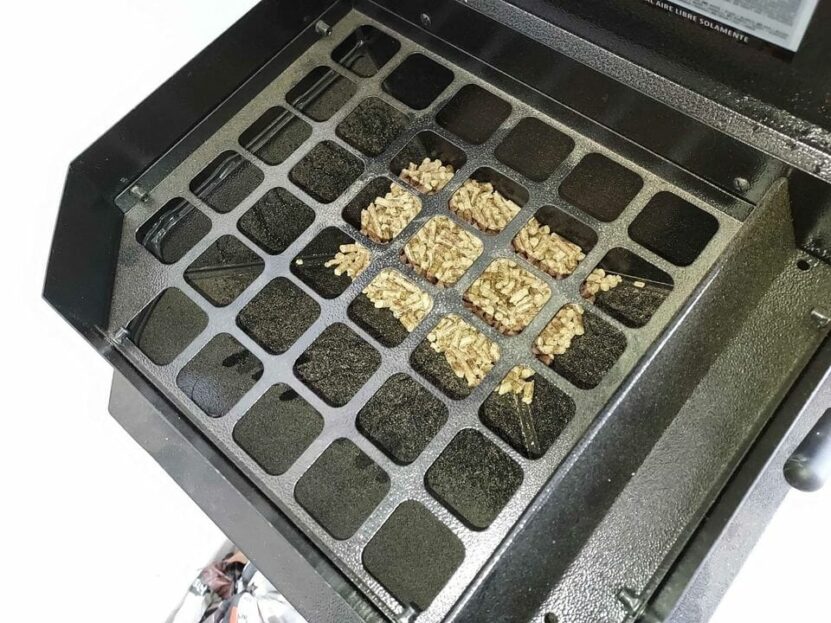Pellet grills have gained immense popularity among BBQ enthusiasts for their ease of use and the unique flavor they impart. A common question that arises for new and seasoned users alike is the matter of storing them in the hopper.
Can they be left there, or do they need to be emptied after each use? Now, we want to present you with this guide of ours which provides insights based on research, expert opinion, and best practices. Buckle up and let us begin.
Understanding the Pellet Grill
Before diving into the specifics of pellet storage, it’s essential to understand the mechanics of a grill. A holistic comprehension will guide your decision-making process.
How Pellet Grills Work
Pellet grills, unlike traditional charcoal grills or gas variants, rely on small wood as fuel. These are fed into a burn pot via an auger, where they’re ignited by a hot rod. The resulting smoke and heat cook the food, giving it that desired smoky flavor.
While grills offer precise temperature control and versatility, their dependence on electronic components also makes them sensitive to external factors, including moisture.
Importance of Dry Pellets
Water is wood pellets’ greatest enemy. When exposed to moisture, they swell, lose their shape, and become unusable. Worse, wet can clog the auger, potentially damaging the grill and ruining its efficiency. Thus, ensuring they remain dry is crucial for the optimal functioning of the grill.
Dangers of Leaving Pellets in the Hopper
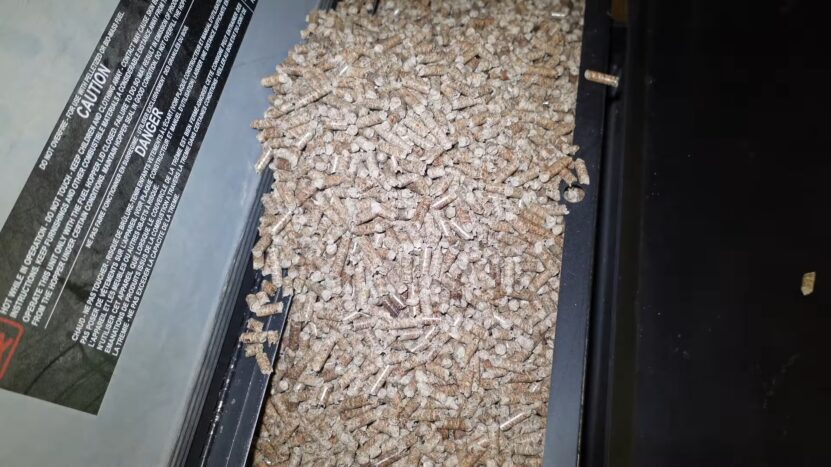
The decision to leave them in the hopper shouldn’t be made lightly. While it might seem like a convenient storage solution, there are several potential pitfalls.
Moisture Accumulation
Hoppers are not airtight. In humid conditions or during rainfall, moisture can find its way in. As previously mentioned, wet ones can lead to numerous problems, from rendering them ineffective to causing mechanical issues.
For those living in particularly humid climates or areas with unpredictable weather patterns, the risk of moisture accumulation is even higher, making it imperative to reconsider leaving them in the hopper.
Pellet Deterioration Over Time
Pellets left inside for extended periods can begin to deteriorate in quality, even without direct exposure to moisture. As they break down, they can create dust, which doesn’t burn as efficiently as a whole. It often results in uneven temperatures and can impact the flavor of your smoked foods.
Best Practices for Pellet Storage
While there are clear risks associated with leaving it in the hopper, that doesn’t mean you can’t take measures to protect them. By adopting a few best practices, you can mitigate potential problems and ensure your grilling sessions are always top-notch.
Using Pellet Storage Containers
Consider investing in airtight storage containers. These containers are designed to keep out moisture, ensuring they will remain dry and intact. Whenever you finish grilling, simply transfer any remaining ones from the hopper to one of these containers.
Regularly Checking and Cleaning the Hopper
Even if you decide to leave it occasionally, make it a habit to check them regularly. Feel for signs of moisture and inspect them for any deterioration. Additionally, routinely cleaning the hopper can prevent dust buildup, ensuring that the auger functions smoothly.
Pellet Quality and Longevity
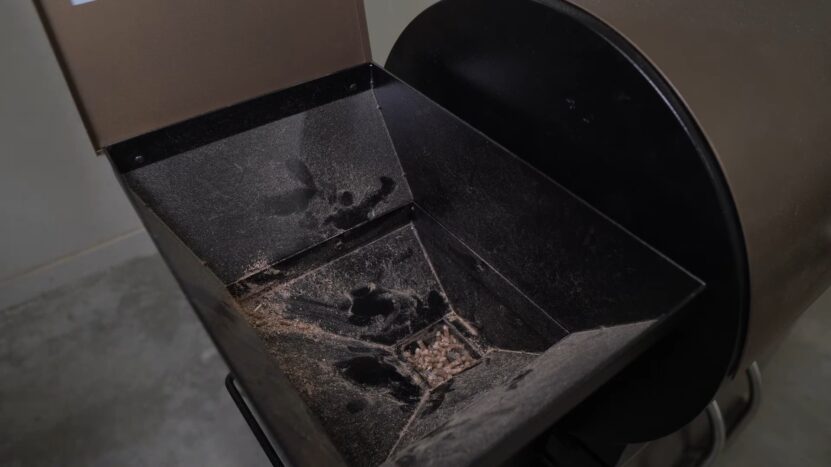
Understanding the importance of pellet quality can further inform the decision about storing them in the hopper. Not all are created equal, and their longevity might depend on their composition and manufacturing process.
Different Types
There are various types available in the market, ranging from 100% hardwood to those mixed with fillers or binders. While 100% hardwood ones tend to burn cleaner and offer a more authentic flavor, those with fillers might deteriorate faster when left in the hopper.
Pellets also come in a plethora of flavors, from hickory and cherry to mesquite. The density and moisture content can vary between these types, affecting their storage capabilities.
Manufacturing Process and Longevity
High-quality ones undergo a rigorous manufacturing process where they’re compressed under extreme pressure, eliminating most of the moisture. These tend to be more resilient and less susceptible to moisture compared to cheaper, low-quality alternatives.
Regardless of quality, neither type is entirely immune to the detrimental effects of prolonged exposure to humidity and moisture.
Potential Solutions and Accessories
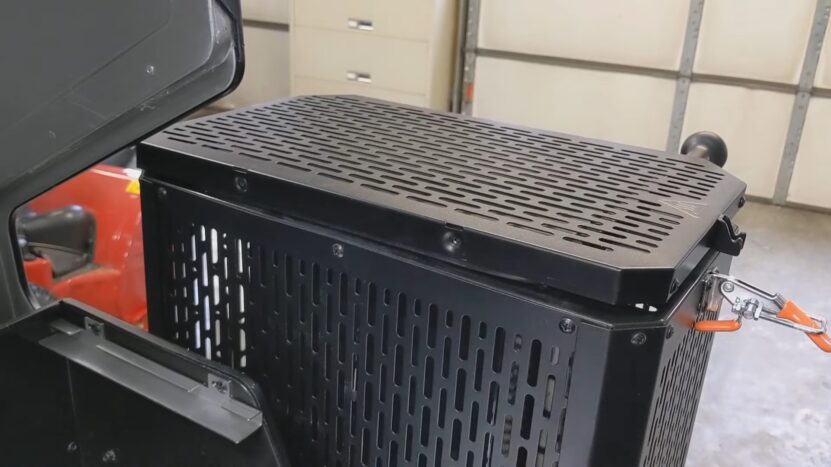
For those who find it challenging to empty the hopper regularly, there are several accessories and solutions available to help.
Hopper Covers
Hopper covers or lids are designed to shield them from external elements. While they don’t make the hopper airtight, they offer a first line of defense against rain, snow, or dew, reducing the chance of moisture entering the hopper.
It’s worth noting that in extremely humid conditions, the moisture in the air can still affect them, even with a cover.
Hopper Pellet Vacuums
A relatively new accessory in the BBQ world, vacuums can quickly and efficiently remove them, making the task less cumbersome. If you grill frequently and don’t want to risk leaving them inside overnight, a vacuum can be a valuable tool in your arsenal.
Recommendations
When deciding whether or not to leave pellets in the hopper, consider your local climate, the frequency of your grilling sessions, and your willingness to maintain the grill.
Climate Considerations
If you live in an area with frequent rain or high humidity, it’s generally a good idea to empty the hopper after each use. In drier climates, you might get away with leaving them for a day or two, but still, regular checks are essential.
Frequency of Grilling
For those who grill almost daily, leaving them in the hopper might seem convenient. But remember, the longer they sit, the more they’re exposed to potential moisture, even if the weather remains dry.
FAQs
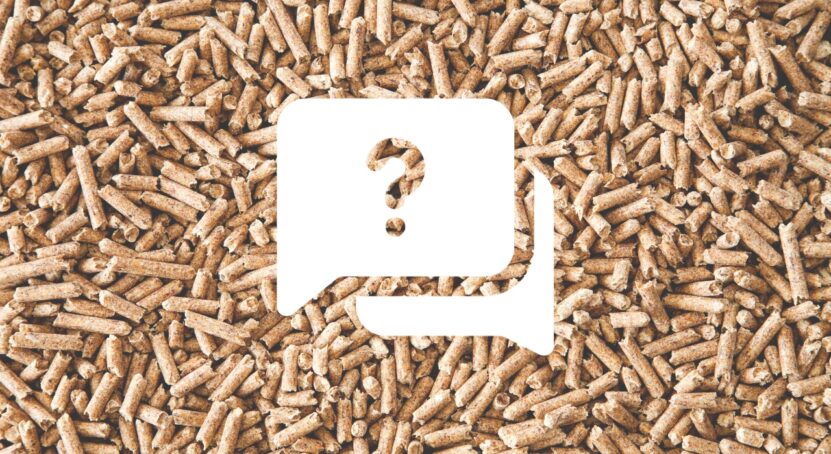
Can I Leave Pellets in The Hopper After Using the Appliance?
Yes, you can leave pellets in the hopper after using the appliance. However, it’s essential to ensure the storage conditions are dry to prevent them from absorbing moisture.
What Happens if The Pellets Absorb Moisture?
Those that absorb moisture can swell, break apart, and become unusable. Moisture-laden ones can also cause performance issues in appliances, such as reduced heat output or uneven burning.
How Can I Prevent Moisture from Getting Into the Hopper?
It’s crucial to store it appliance in a dry location, preferably under a weatherproof cover. Some users also keep a desiccant inside the hopper or store their appliances in a shed or garage to prevent moisture exposure.
How Long Can Pellets Remain in The Hopper without Being Used?
Under dry conditions, it can remain in the hopper for extended periods without degradation. However, it’s advisable to check them for signs of moisture or mold before using them if they have been stored for several months.
Is There a Particular Type of Pellet That’s More Resilient to Moisture than Others?
While all wood pellets are prone to moisture absorption, some brands might use binders or treatments that offer a slight improvement in moisture resistance. Check with the manufacturer for specific details.
Key Takeaways
Pellet grills have revolutionized the art of barbecuing, offering an unparalleled combination of convenience and flavor. Yet, as with any tool, understanding its intricacies is vital for optimal performance.
The question of whether to leave it in the hopper might seem minor, but the implications are significant.
When weighing the pros and cons, it’s clear that while the convenience of leaving pellets in the hopper is tempting, the risks often overshadow the benefits.
Moisture, deterioration of quality, and potential grill damage are challenges that any enthusiast would want to avoid.
